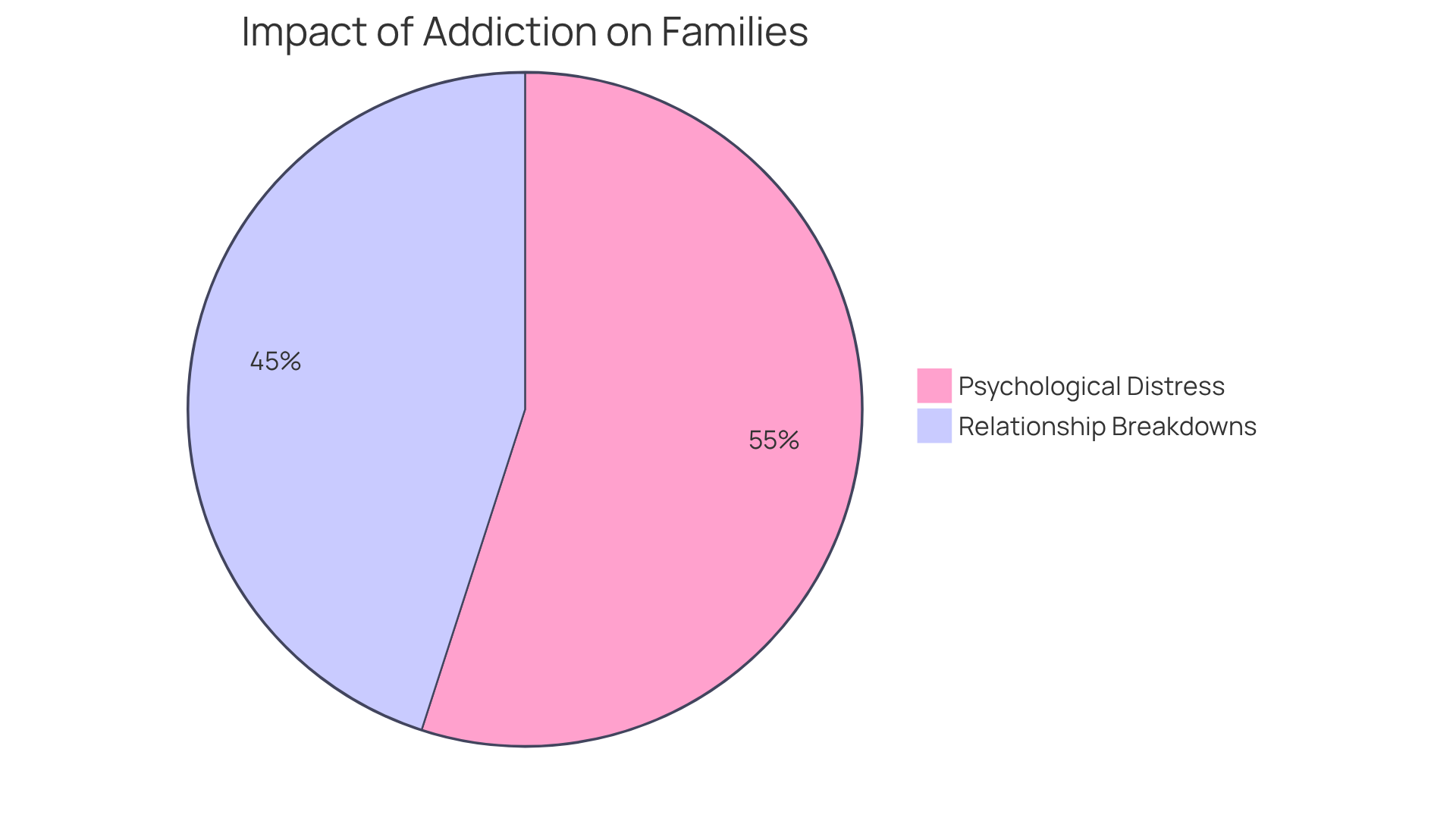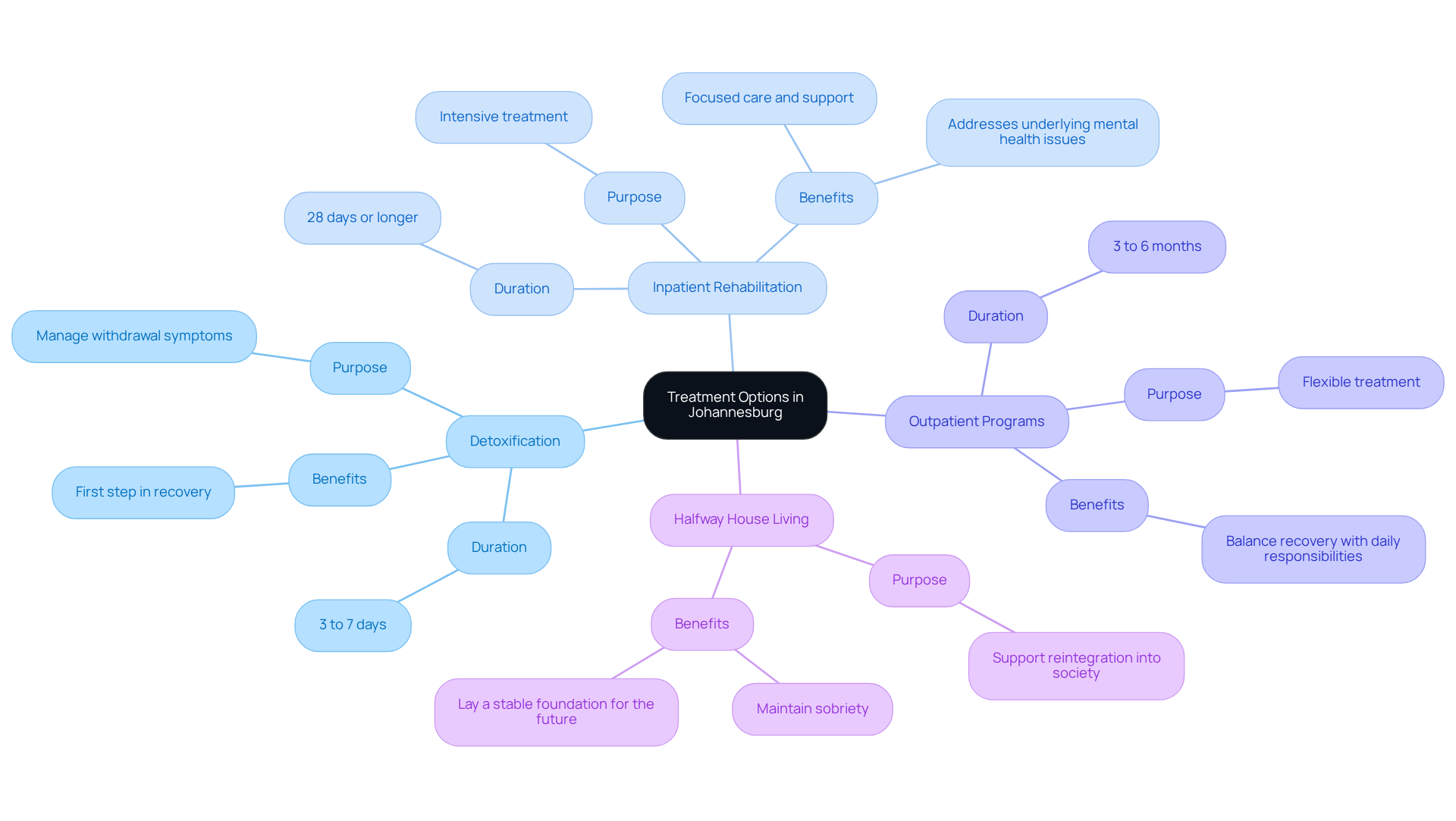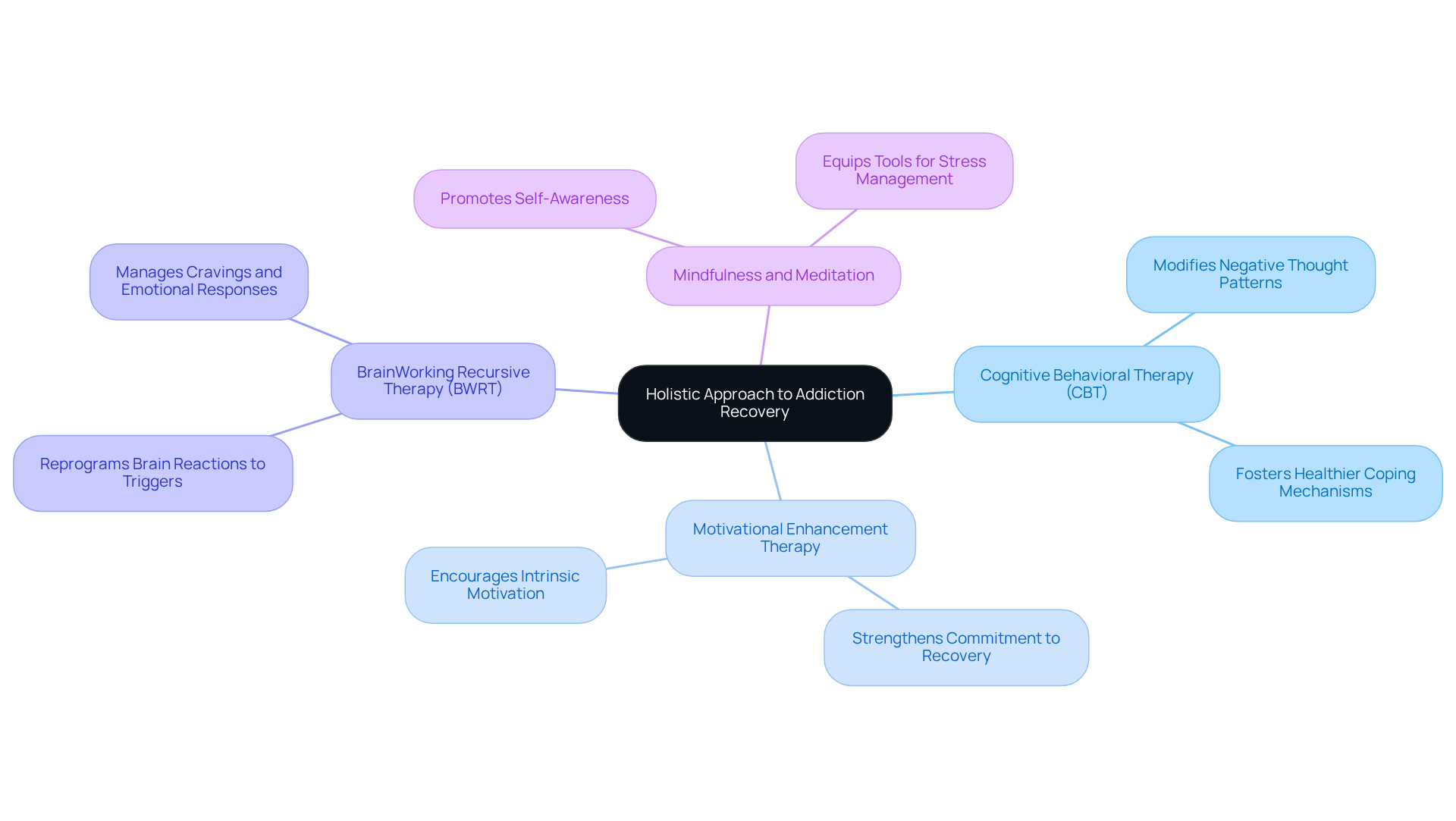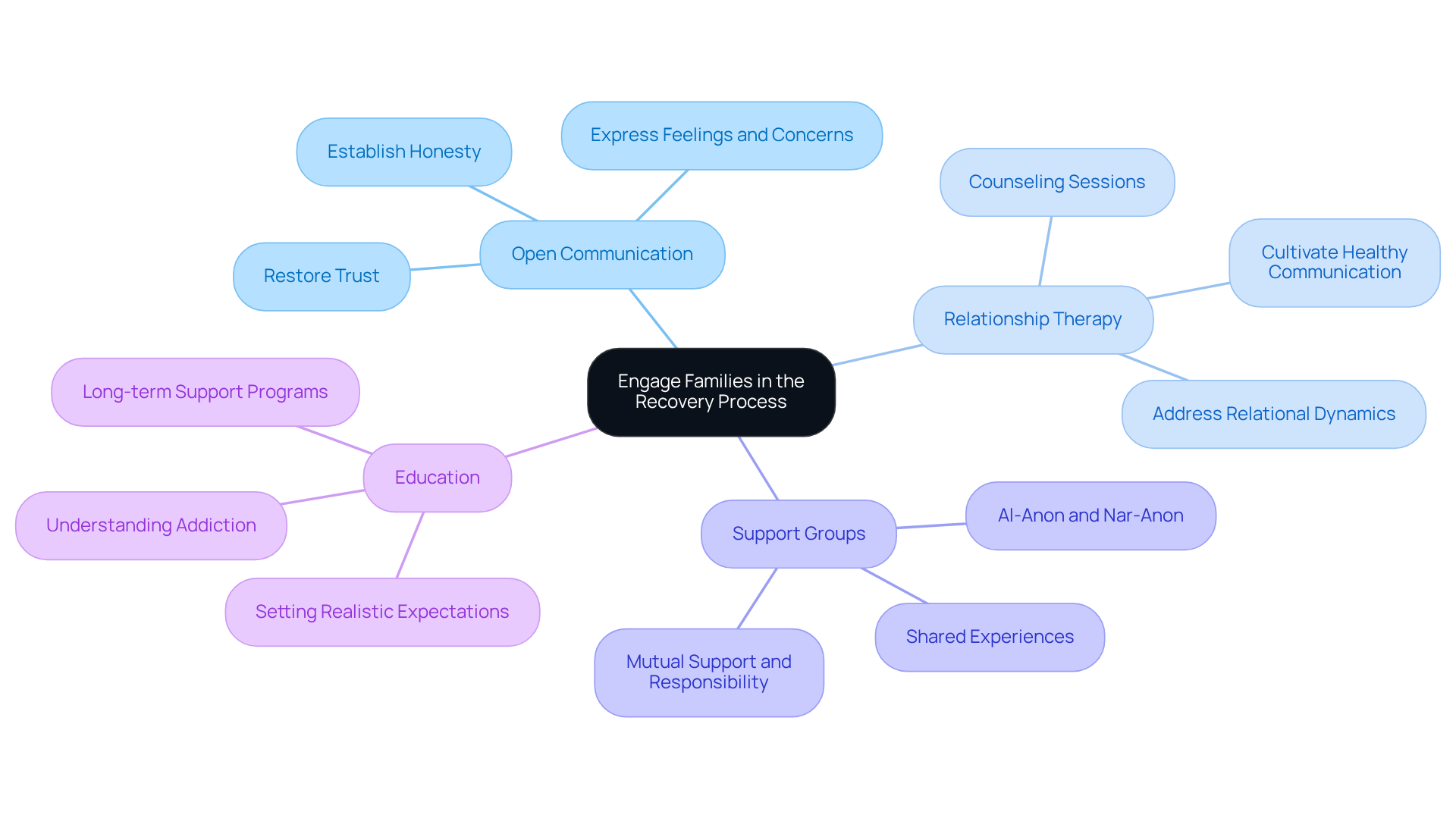Overview
The article highlights the critical importance of understanding addiction treatment in Johannesburg, particularly for families. It acknowledges the profound impact addiction can have on family dynamics, emphasizing the necessity of involving relatives in the recovery process. Families often experience emotional distress and relationship breakdowns, which can be overwhelming. By recognizing these challenges, we can better appreciate the need for supportive resources.
Moreover, the article outlines various treatment options and holistic approaches that can significantly improve outcomes. When families actively participate in their loved one’s recovery journey, they foster a nurturing environment that promotes healing. You are not alone in this struggle, and together, we can navigate the path toward recovery with compassion and understanding.
Ultimately, engaging in the recovery process not only benefits the individual but also strengthens family bonds. We understand the emotional toll addiction takes, and we encourage families to seek out supportive resources that can guide them through this journey. Remember, your involvement is invaluable, and every step taken together is a step toward healing.
Introduction
Addiction is a pervasive issue that deeply affects not only individuals but also their families, often leading to emotional turmoil and fractured relationships. We understand that navigating this complex landscape can be overwhelming. It’s crucial for families to recognize the ripple effects of addiction and how they can support their loved ones through recovery. How can you foster an environment that encourages healing?
This article explores the various treatment options available in Johannesburg, highlighting the importance of a holistic approach. We will also discuss effective strategies for family involvement in the recovery process. Together, we can illuminate a path toward hope and resilience, reminding you that you are not alone in this journey.
Define Addiction and Its Impact on Families
Addiction is recognized as a chronic disease that compels individuals to engage in compulsive substance use despite the harmful consequences. This condition alters the brain’s reward system, leading to significant changes in behavior and emotional regulation. Families often endure the brunt of substance dependence’s impact, experiencing emotional distress, financial strain, and disrupted relationships. Have you felt the weight of this struggle? Studies show that roughly 68% of relatives report relationship breakdowns due to the turmoil related to substance dependence, while 83% endure psychological distress, including stress and anxiety.
Comprehending these dynamics is essential for relatives as they navigate the intricacies of dependency and strive to assist their loved ones effectively. It is crucial to acknowledge that relatives did not create their loved one’s substance dependence; this awareness can ease feelings of guilt, anger, and confusion that frequently emerge. Recognizing addiction as an illness rather than a moral shortcoming nurtures compassion and motivates relatives to take on supportive roles in their loved ones’ healing journeys. This shift in perspective is vital, as it enables families to transition from enabling behaviors to more beneficial forms of support, ultimately leading to improved outcomes in recovery.
At Changes Rehab, we highlight the significance of support from loved ones in the addiction treatment Johannesburg recovery process. Transformative experiences shared by clients emphasize the effectiveness of our programs, illustrating how our supportive environment allows loved ones to breathe easier, knowing their relatives are safe and receiving the care they require. As one client noted, ‘I felt like a terrible mom, but it is definitely worth it. I also knew that he was safe and I could finally breathe.’ This demonstrates the profound effect that compassionate care and a thorough addiction treatment Johannesburg strategy can have on both individuals and their families. You are not alone in this journey; together, we can foster healing and hope.

Explore Treatment Options in Johannesburg
In Johannesburg, individuals grappling with addiction can find a variety of treatment options designed to meet their unique needs. These options include:
- Detoxification: This medically supervised process is essential for safely managing withdrawal symptoms, which often last between 3 to 7 days. It serves as the first step in recovery, preparing individuals for further treatment.
- Inpatient Rehabilitation: A structured program where participants reside at a facility for intensive treatment, typically lasting around 28 days or longer. This immersive environment provides focused care and support, addressing both the addiction and any underlying mental health issues.
- Outpatient Programs: These flexible treatment options allow individuals to live at home while attending therapy sessions, helping them balance recovery with daily responsibilities.
- Halfway House Living: Transitional housing that offers crucial support as individuals reintegrate into society, assisting them in maintaining sobriety and laying a stable foundation for their future.
Each treatment option offers unique benefits tailored to an individual’s circumstances. For instance, research indicates that nearly 50% of those with substance use disorders also face dual diagnoses, underscoring the importance of comprehensive care that addresses both dependency and mental health. Families are encouraged to thoughtfully consider factors such as the severity of the addiction, the individual’s current support network, and any co-occurring mental health issues when selecting a treatment path. Success stories from local rehabilitation facilities highlight the effectiveness of these programs, with many individuals achieving long-term wellness through structured support and personalized care. Remember, you are not alone in this journey, and there is hope for a brighter future.

Understand the Holistic Approach to Addiction Recovery
A comprehensive approach to addiction treatment Johannesburg sees the individual as a whole, addressing their physical, emotional, mental, and spiritual needs. This holistic strategy includes several effective therapeutic modalities that can truly make a difference:
- Cognitive Behavioral Therapy (CBT): This evidence-based approach empowers individuals to identify and modify negative thought patterns that contribute to substance use, fostering healthier coping mechanisms.
- Motivational Enhancement Therapy: This therapy encourages individuals to discover and harness their intrinsic motivation for change, strengthening their commitment to recovery.
- BrainWorking Recursive Therapy (BWRT): A unique method that focuses on reprogramming the brain’s reactions to triggers, helping individuals manage cravings and emotional responses more effectively.
- Mindfulness and Meditation: These techniques promote self-awareness and emotional regulation, equipping individuals with essential tools to manage stress and anxiety, which are common relapse triggers.
By combining these therapies, families can play a vital role in supporting their loved ones during addiction treatment in Johannesburg, promoting a more balanced and sustainable healing journey. Remember, you are not alone in this process; we understand the challenges you face and are here to help.

Engage Families in the Recovery Process
Involving relatives in the healing process is vital for improving treatment results. How can families foster this involvement? Here are some effective strategies:
- Open Communication: Establishing a culture of honesty allows family members to express their feelings, expectations, and concerns regarding addiction and recovery in a safe space. This openness is essential for restoring trust and understanding within the household.
- Relationship Therapy: Engaging in counseling sessions specifically tailored to address relational dynamics can significantly enhance relationships. At Changes Rehab Johannesburg, these organized sessions create a setting for addressing deep-rooted issues and cultivating healthier communication patterns. This equips relatives with the resources they need to assist their loved ones effectively.
- Support Groups: Joining support groups like Al-Anon or Nar-Anon provides households a platform to share experiences and gain insights from others facing similar challenges. These groups highlight the significance of mutual support and responsibility in the healing process, reinforcing the notion that dependence is a communal illness that necessitates collective healing.
- Education: Informing relatives about dependency and healing processes provides them with the insight to better comprehend their loved one’s experiences. Changes Rehab offers extensive addiction education as part of their addiction treatment in Johannesburg, assisting relatives in understanding the intricacies of addiction and the significance of their involvement in the healing process. This understanding nurtures compassion, helps households set realistic expectations, and allows them to recognize supportive behaviors. Moreover, participation in the long-term secondary program and outpatient care can further enhance support and integration into the healing journey.
By actively participating in the recovery process, families can cultivate a nurturing environment that promotes healing and resilience. Together, we can enhance the chances of sustained recovery. Remember, you are not alone in this journey.

Conclusion
Addiction is a complex and chronic condition that impacts not only those grappling with substance use but also their families. We understand that navigating the challenges posed by a loved one’s struggles can be overwhelming. Recognizing addiction as a disease, rather than a moral failing, allows families to create a supportive environment that nurtures healing and recovery. This shift in perspective is essential for breaking the cycle of guilt and enabling more constructive forms of support.
In this article, we explored various aspects of addiction treatment in Johannesburg. From defining the condition and its repercussions on families to outlining specific treatment options available in the area, we emphasized the importance of a holistic approach. This approach addresses the physical, emotional, and psychological needs of individuals. Engaging families in the recovery process through open communication, relationship therapy, support groups, and education is vital for achieving successful treatment outcomes.
Ultimately, the journey of recovery from addiction is a collective effort. It requires the involvement of families and the community. By actively participating in their loved ones’ healing journeys, families can create an environment conducive to sustained recovery. Remember, help is available, and you are not alone in this struggle. Embracing support, understanding, and compassion can lead to a brighter future for both individuals and their families.
Frequently Asked Questions
What is addiction and how does it affect individuals?
Addiction is a chronic disease that drives individuals to engage in compulsive substance use despite harmful consequences. It alters the brain’s reward system, leading to significant changes in behavior and emotional regulation.
How does addiction impact families?
Families often experience emotional distress, financial strain, and disrupted relationships due to a loved one’s substance dependence. Studies show that approximately 68% of relatives report relationship breakdowns, and 83% endure psychological distress such as stress and anxiety.
What can relatives do to support their loved ones with addiction?
Relatives can support their loved ones by understanding that addiction is an illness rather than a moral failing. This perspective helps reduce feelings of guilt, anger, and confusion, allowing families to transition from enabling behaviors to more constructive forms of support.
Why is it important for families to recognize addiction as an illness?
Recognizing addiction as an illness fosters compassion and motivates relatives to take on supportive roles in their loved ones’ healing journeys. This shift in perspective is crucial for improving recovery outcomes.
What role does support from loved ones play in addiction treatment?
Support from loved ones is significant in the addiction treatment process, as it can create a safer environment for recovery. Transformative experiences shared by clients highlight the effectiveness of supportive care in helping both individuals and their families cope with addiction.
How can families cope with their feelings related to a loved one’s addiction?
Families can cope by acknowledging that they did not cause their loved one’s addiction and focusing on how to provide effective support. This understanding can help alleviate feelings of guilt and confusion.


